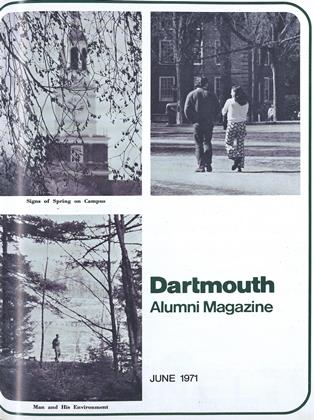ByRichard Montague '23. New York: Random House, 1971. 307 pp. Illustrated.$6.95.
Richard Montague has pulled together the record of an exciting era in aviation exploration almost forgotten by many and never known by considerably more. How can one explain to the under-fifty crowd the international wave of emotion and adulation created by Lindbergh's flight, the universal anxiety and suspense generated by Amundsen's trip over the North Pole in the Norge, or the mass hysteria and jubilation associated with Chamberlain's and Levine's odyssey?
Those of us who are old enough to recall the achievements may, in retrospect, find it difficult to understand why we were honed to such an ecstatic edge by these early flights. Mr. Montague helps us do that by placing the 1920's and the early 1930's in sharp perspective in terms of people, places, and events. He accomplishes this not as a historian but through the penetrating eyes and sharp ears of the trained reporter who seeks out the story behind the story.
In the capacity of news-reporter (NewYork Herald and Herald Tribune) it was his assignment to cover many of the ventures he describes in Oceans, Poles and Airmen. Through his professional contacts he came to know scores of the aviators, designers, engineers, promoters, publicity seekers, and hangers-on who made these flights either possible or almost impossibly difficult. He shows them as they were, some brave, competent and prepared; others foolhardy, adventurous, and ill-fated. He does it with an easy style, a touch of humor, and much compassion for the individuals involved.
The reader will be impressed with the author's ability to put him in the cockpit of the frail aircraft of the day, and there experience the noise, vibration, cold, fatigue, and sense of apprehension over possible aircraft malfunction or deteriorating weather conditions on these record-making or record-breaking flights.
Montague has obviously done a first-rate job on researching material for the book and expertly draws on his sources to flesh out the personalities who fly, some of whom crash and die to prove transocean and polar flight a practical operation for the future. In so doing, he accomplishes his objective to keep the memories of these brave men and women "bright a little longer" and incidentally to expose the monumental fraud of Admiral Byrd's claim to have reached the North Pole. There is a little of the overkill in the latter episode, but it makes fascinating reading and documents the reasons for the rumblings of a quarter century over a controversial figure.
Colonel Canavan, USMC (Retired), aformer airline and flight test pilot, and acareer Marine officer, is now ExecutiveOfficer of the Thayer School of Engineeringat Dartmouth.
 View Full Issue
View Full Issue
More From This Issue
-
 Feature
FeatureMan and His Environment
June 1971 By ALVIN O. CONVERSE -
 Feature
FeatureRETIRING FACULTY
June 1971 By B.B. -
 Feature
FeatureWhat Price Clean Air?
June 1971 By Robert B. Graham '40 -
 Feature
FeatureTeaching at a Communist University
June 1971 By NOEL PERRIN -
 Feature
FeatureThe Marxist View of Overpopulation
June 1971 By Charles W. Collier '71 -
 Article
ArticleA Second Life Through Heart Surgery
June 1971 By Daniel L. Dyer '39
Books
-
 Books
BooksMemories and Anecdotes
January 1916 -
 Books
BooksEDITOR’S PICKS
MARCH | APRIL 2014 -
 Books
BooksSHADOWS ON THE LAND — AN ECONOMIC GEOGRAPHY OF THE PHIL IPPINES.
MAY 1964 By ALBERT S. CARLSON -
 Books
BooksMEET CALVIN COOLIDGE: THE MAN BEHIND THE MYTH.
July 1960 By C.E. WIDMAYER '30 -
 Books
BooksMAURICE HEWLETT: HISTORICAL ROMANCER
January 1939 By David Lambuth -
 Books
BooksA HISTORY OP AMERICAN GOVERNMENT AND CULTURE
June 1931 By H. B. P.

